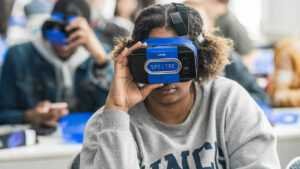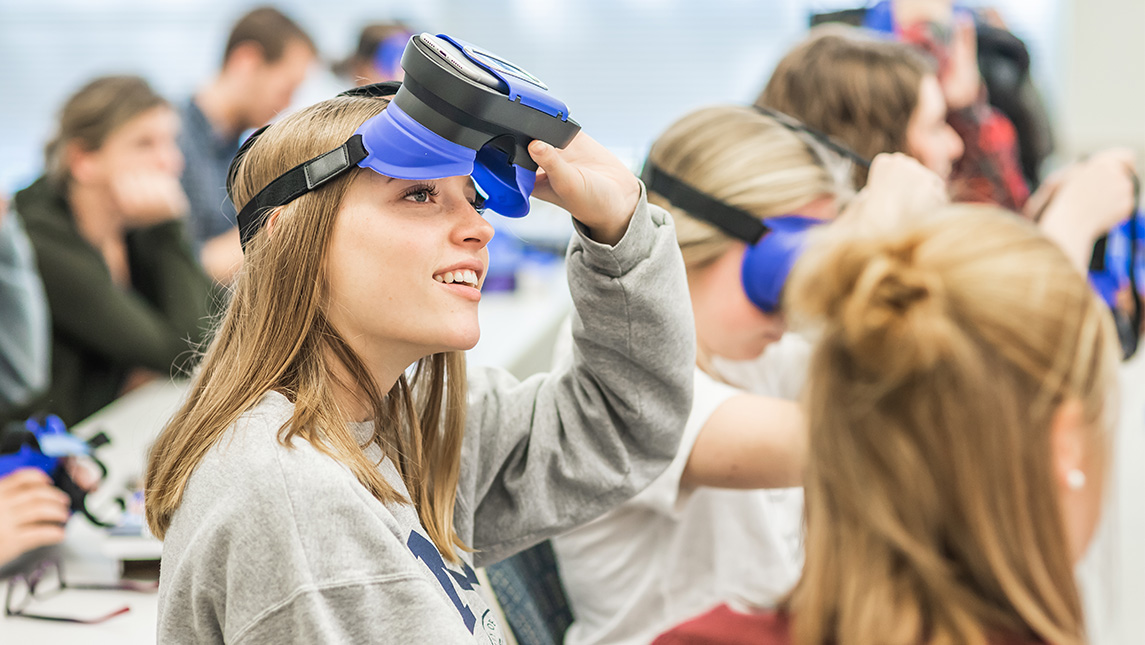How soon before most companies ask if you’d like to pay for your order in Bitcoin? Will you be using smart contracts to manage your corporation’s transactions with vendors and clients? Will “blockchain technology” become a coveted skill on resumes?
It’s questions like these that interest Business Management Professor Nir Kshetri with UNC Greensboro’s Bryan School of Business and Economics. He’s had his finger on the pulse of emerging technologies that affect everything from salaries to e-commerce to cybersecurity.
Most recently, he is advancing research on cryptocurrency and the Metaverse, a burgeoning digital environment for people to interact, shop, and work through virtual reality, augmented reality, or gaming engines. Both of these tools could one day become an ordinary part of doing business.
“Students need to learn about this,” says Kshetri. “They might be doing work in the Metaverse. They might be collaborating in the Metaverse or launching a product in the Metaverse. They have to understand how these tools function. They have to be aware of the scams that exist.”
Who’s buying crypto?

“In the U.S. the last survey showed 16 percent of the U.S. population owns some type of crypto,” Kshetri explains. “It may be more than that now.”
Cryptocurrency has been around since the invention of Bitcoin in 2009. There are now about 20 thousand types of digital currency in circulation.
With that comes news reports of speculative booms and collapses, early investors becoming millionaires seemingly overnight, social media influencers promoting NFTs, and scandals such as the fall of the crypto exchange FTX. The U.S. government still looks at the ventures with skepticism. The risk of scams remains high.
“Crypto is defusing less rapidly than other technologies,” said Kshetri. “It is a very complicated technology for people to understand.”
The majority of mainstream cryptocurrencies, he says, are also not backed by any fiat currency or physical resource. “They are just decentralized ways of making payment.”
As their value is determined by speculative interest, his advice to anyone curious in personally investing in cryptocurrency now is to keep its high risks at the front of the mind. “If you’re not prepared to lose it all, you should not invest.”
Financial lifelines

Internationally, cryptocurrency has created a new financial platform for people who never had even one electronic payment option. In countries where the fiat currency is hindered by economic upheaval or rapid inflation, it may keep a family alive.
“In many developing countries, only ten percent of people have a bank account,” says Kshetri. “Access to financial services is one of the most important tools that give people power.”
Kshetri’s most recent research focuses on cryptocurrency in developing and economically unstable countries such as Venezuela, where the bolivar’s inflation rate is at 65,000 percent. Venezuelans living outside the country can send money back home as cryptocurrency without paying high exchange fees.
“There’s a new transfer agency focused on Latin America that can convert money into the bolivar,” says Kshetri. “The transfer fee is less than one percent.”
He also observed how people around the world sustained their families during the COVID-19 pandemic by playing online games through the Metaverse. “A lot of people were locked down and could not work,” he says. “The only way to make a living, in Venezuela, in the Philippines, Brazil, Ghana, was to go online and play games, using non-fungible tokens or NFTs.”
At one point, 2.5 million daily active users played just one of these Metaverse games. The NFT value has since dropped by about 90 percent. But at the time, Kshetri says, “they were lifelines for many of the people playing.”
What do companies like about blockchains?
Cryptocurrencies use “blockchains” to record purchases. A blockchain works like a ledger, tracking purchases and exchanges of goods. Each interaction is recorded within a digital “block” of data. The records are maintained by a peer-to-peer network of computers around the world.

Should something happen to company servers, or a bad actor tries to sabotage the records, the other nodes in the network should cross-reference with each other and account for an incorrect or missing entry.
The possibilities of blockchains go beyond currency. They can be used to catalog inventory. They can cut out middlemen between the buyer and seller and therefore lower transfer fees. They provide a provable record for addressing disputes.
“One application is called the ‘smart contract,'” says Kshetri. “The computer code enforces the contract. Say that you are a supplier to my company. After someone verifies that the shipment arrived, then the smart contract has the cryptocurrency automatically transferred from my account to your account without any intervention from people.”
The future of digital commerce
Cryptocurrency’s future will likely be decided by how stable it gets and what kinds of regulations come into play. Governments can’t easily track how cryptocurrency is being spent, and whether it is being used for criminal or terrorist purposes. And setting regulations must be weighed against the rights of the individual.
“If you have your hundred-dollar fiat currency right now, no one knows how you are spending it,” says Kshetri. “Digital currency has to guarantee some people a level of privacy. It also has to guarantee the government’s ability to monitor that it is not going to adversaries.”
However cryptocurrency is implemented, Kshetri will be there to see how it evolves so that students, investors, and business owners capitalize on its potential.
“Blockchain is a good technology. Blockchain combined with cryptocurrency has many applications. They can be used to solve many problems in the world.”
Story by Janet Imrick, University Communications
Photography by Mike Dickens, Bryan School of Business and Economics; and Jiyoung Park, University Communications
Graphics by Jaysen Buterin and De’Andre Gilliard, University Communications

Start building your dream career



